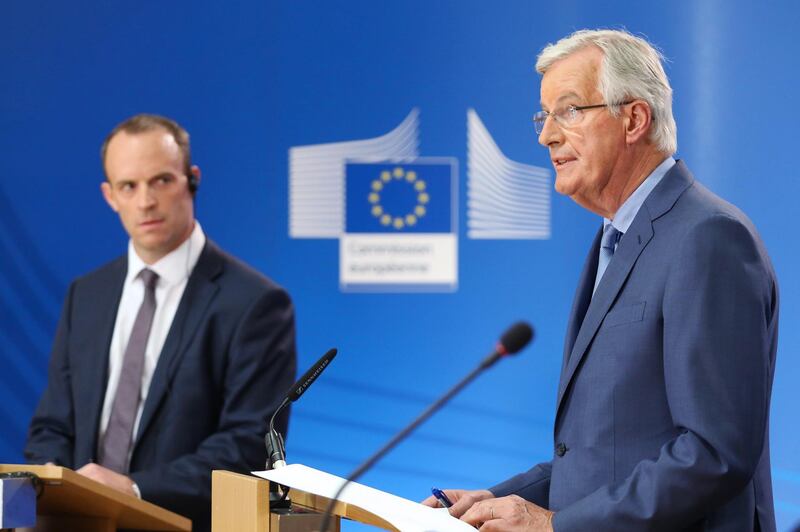The European Union sent prime minister Theresa May back to the drawing board on Brexit, rejecting her proposal for a new trade pact in a blow to hopes of striking a deal by October.
The pound weakened on the news.
In a blunt public critique of Mrs May’s plans, chief EU negotiator Michel Barnier said he will never accept her proposal for a new customs arrangement, which she saw as her best hope of reaching an accord that she can sell to a divided Parliament in London.
On July 12, Mrs May put forward a model under which the UK would collect the EU’s tariffs on goods entering the country, as part of a plan to keep trade with the bloc flowing freely after the split. But speaking at a press conference in Brussels on Thursday, Mr Barnier said this would never be acceptable.
“The EU cannot – and the EU will not – delegate the application of its customs policy and rules, VAT and excise duty collections to a non-member who would not be subject to the EU’s governance structures,” Mr Barnier told reporters as he stood next to UK Brexit secretary Dominic Raab.
The EU’s verdict is a blow to May. Her allies believe her carefully constructed compromise plan is the only option that could be acceptable to the feuding pro and anti-Brexit wings of her Conservative Party.
If the premier can’t persuade her own members of Parliament to back an agreement, the UK will be on course to crash out of the bloc with no deal on March 29 next year. Equally, unless she can agree to a blueprint that the EU also accepts, she won’t have any deal to sell at all.
Thursday’s public appearance in the Belgian capital was the first time Mr Barnier and Mr Raab have held a full press conference since the minister took over from David Davis on July 9.
Mr Davis, an ardent campaigner to leave the EU, quit Mrs May’s cabinet because he disagreed so strongly with her trade plans. Both Mr Davis and foreign secretary Boris Johnson, who also resigned in protest, believe the premier is tying the UK too closely to the EU’s trading regime in a way that would never be workable.
Brexit backers like Mr Davis and Mr Johnson want a clean split, and Mrs May is under pressure from as many as 80 other eurosceptic Conservatives to toughen up her proposals and pursue a hard divorce.
The EU, however, wants Mrs May to take an even softer line than she already proposes. Mr Barnier offered her a potentially inflammatory alternative: stay inside the EU’s existing customs union.
Mrs May has repeatedly promised to leave the customs union, and if she reneges on that she would run the risk of being ousted. Staying inside such an arrangement is the official policy of the UK’s main opposition Labour Party, and is favoured by the pro-EU members of Mrs May’s party who have rebelled against her. That makes his suggestion particularly provocative.
“I have always said the EU is open to a customs union,” Mr Barnier said.
The pound weakened on his comments and was down 0.5 percent at $1.3129 as of 6:25 p.m. in London time.
Mr Barnier was speaking at the end of another week of talks that have focused on the conundrum of how to avoid a hard border in Ireland when it becomes the frontier between the UK and the EU. The two sides also discussed the UK’s goals for future economic ties with its biggest trading partner. Mr Barnier said there had been progress on the issue of security and data sharing.
But the most important negotiations have virtually stalled with just 12 weeks to go before a self-imposed October deadline to reach a divorce agreement. Both sides have stepped up “no-deal” contingency planning.
In the press conference, Mr Barnier was blunt, telling Mr Raab that the EU also has red lines. “The UK wants to take back control, Dominic, of its money, law and borders – and you said this point in an article this morning,” Mr Barnier said. “We will respect that. But the EU also wants to keep control of its money, law and borders – and the UK should respect that.”
For his part, Mr Raab put a more positive gloss on the state of play in negotiations. “We’ve got a template for a good relationship,” he said of Mrs May’s blueprint.
Mr Raab said the Brexit negotiations will resume in mid-August, with weekly discussions from then onward in order to “clear away all the obstacles that lie in our path.”
Both sides say they want to finalise a deal in October to give the UK and European parliaments time to approve it before Britain’s departure from the EU on March 29.






